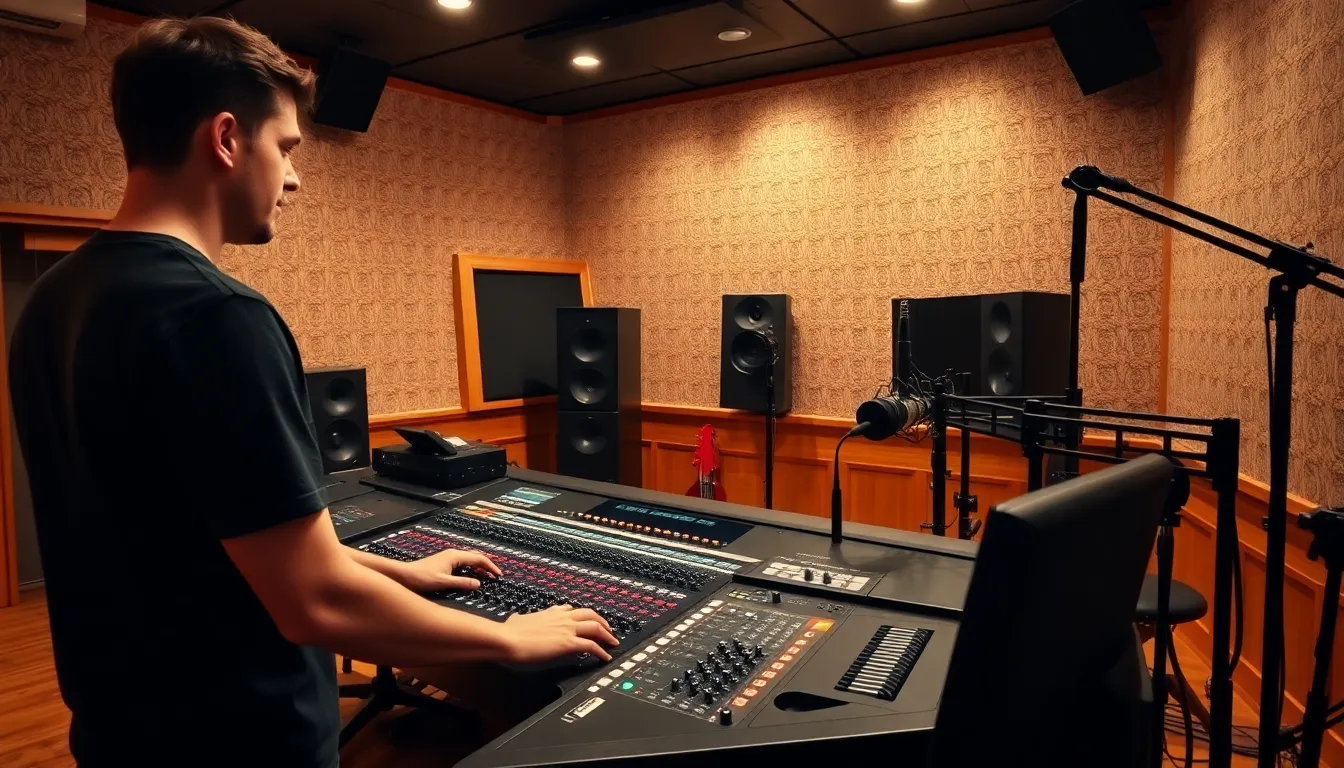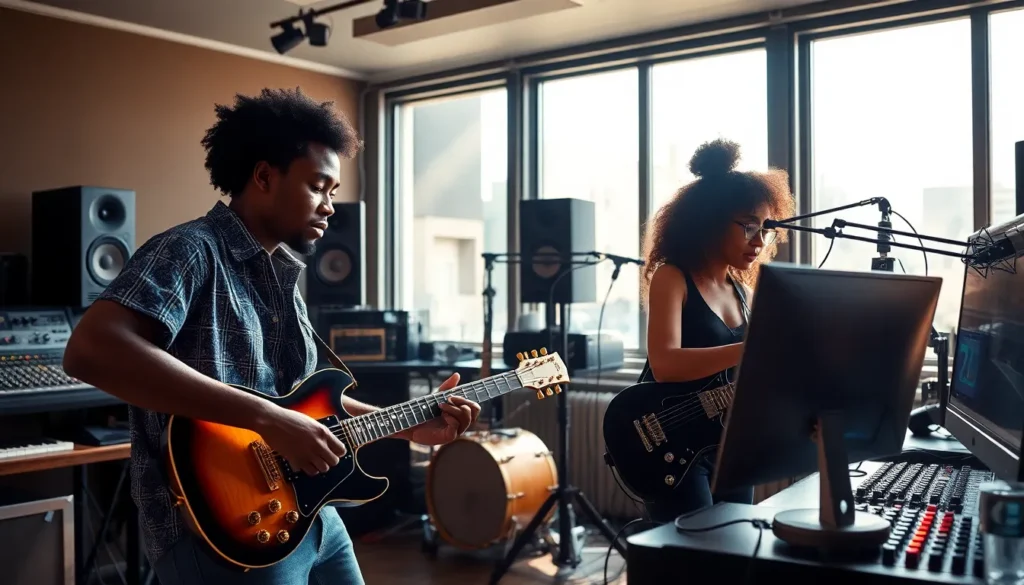Table of Contents
ToggleIn a world where everyone believes they can be the next pop sensation, music recording studios stand as the magical realms where dreams transform into chart-topping hits. These creative sanctuaries are more than just rooms filled with fancy equipment; they’re the secret sauce behind the music that gets stuck in your head. Whether it’s a budding artist trying to make their mark or a seasoned pro looking to capture that elusive sound, these studios offer the perfect blend of technology and artistry.
Imagine stepping into a space where the walls are lined with history and the air buzzes with inspiration. It’s where the magic happens, where melodies come to life, and where even the shyest of singers can belt out a tune without fear of judgment. So, if you’ve ever thought about recording that masterpiece, it’s time to explore what a music recording studio can do for you.
Overview of Music Recording Studios
Music recording studios serve as vital environments for artists aiming to produce high-quality tracks. These spaces combine advanced technology with artistic flair, allowing musicians to capture their creative essence. State-of-the-art equipment enhances sound quality, enabling recording engineers to manipulate audio with precision.
Numerous components make up a professional studio. Control rooms feature mixing consoles and software that facilitate sound engineering processes. Isolation booths allow vocalists and instrumentalists to perform without interference from other sounds. Acoustic treatments optimize sound clarity and prevent unwanted noise, creating ideal conditions for recording.
Many studios provide a range of services. Mixing and mastering often occur on-site, ensuring tracks achieve the desired polish and professional finish. Some facilities offer songwriting assistance and production consultation, lending expertise to artists throughout their projects.
Accessibility varies among studios, with some designed for specific genres while others accommodate diverse musical styles. Studios located in urban areas often attract a wide array of artists due to their prominent reputation and state-of-the-art facilities. In contrast, boutique studios may provide a more intimate atmosphere, appealing to those seeking a personalized recording experience.
Investing time in selecting a studio that aligns with artistic goals enhances the recording process. Artists may seek spaces that resonate with their musical vision, fostering creativity and innovation. Exploring various options allows musicians to identify the best environment for realizing their projects, ultimately leading to successful recordings.
Types of Music Recording Studios

Music recording studios come in various forms, each serving unique needs and preferences. Understanding the differences helps artists select the ideal environment for their projects.
Professional Studios
Professional studios provide high-quality recording experiences for artists. Equipped with advanced technology, these spaces feature top-tier microphones, mixing consoles, and soundproof isolation booths. Engineers with extensive experience often oversee sessions, ensuring optimal sound quality. Many professional studios also offer additional services like mixing and mastering, streamlining the production process. Additionally, they cater to diverse genres, making them suitable for various musical styles. Renowned studios often attract well-known artists, enhancing collaboration opportunities for clients.
Home Studios
Home studios present an accessible option for musicians focused on affordability and convenience. These setups often feature basic recording equipment, like microphones, audio interfaces, and digital audio workstations. While home studios may lack the advanced technology of professional setups, they allow artists to experiment freely in a comfortable environment. Many musicians find that creating at home fosters creativity without pressure. Users can tailor their setups to fit personal needs and preferences. Additionally, home studios often enable quick recording sessions, promoting spontaneity in the creative process.
Key Features of Music Recording Studios
Music recording studios offer essential elements that enhance the creation of high-quality tracks. These features primarily include equipment, technology, and acoustic design.
Equipment and Technology
Studios house various recording equipment designed to capture sound accurately. Microphones come in dynamic and condenser types, catering to different vocal and instrumental needs. Mixing consoles allow sound engineers to blend multiple audio tracks seamlessly. Digital Audio Workstations (DAWs) serve as the core software environments for producing music, enabling artists to edit, arrange, and mix their recordings. Monitors provide accurate sound reproduction, ensuring music translates well across listening devices. Additionally, effects processors like reverb and compression add depth and polish to recordings. Each piece of equipment contributes to the overall sound quality, making studios indispensable for musicians.
Acoustic Design
Acoustic design plays a crucial role in music recording quality. Control rooms benefit from soundproofing techniques to minimize external noise interference. Isolation booths create dedicated spaces for vocalists and instrumentalists, allowing for clear sound capture without bleed from other instruments. Bass traps and diffusers ensure an even acoustic response within recording spaces, reducing unwanted reverberation. High-quality materials, such as acoustic panels, further enhance sound clarity. Every design element focuses on optimizing the listening experience and capturing the most authentic sound possible. This attention to acoustics allows artists to record with confidence, knowing their artistic vision enhances their music.
Selecting the Right Music Recording Studio
Selecting a music recording studio involves careful consideration of various factors. First, assess the studio’s equipment and technology. Professional studios boast microphones, mixing consoles, and Digital Audio Workstations that enhance sound quality. Home studios, while often more accessible, may have basic setups that suit certain projects but limit professional outcomes.
Second, consider the studio’s acoustic design. A well-designed studio features soundproofing, isolation booths, and acoustic treatments that ensure clear recordings. These elements are essential for capturing an artist’s true sound without interference from external noise.
Third, the expertise of studio engineers plays a critical role. Experienced engineers provide valuable insights and support throughout the recording process. This expertise can improve the overall artistic outcome, as they understand how to make the most of the studio’s capabilities.
Fourth, evaluate the studio’s genre specialization. Some studios focus on specific musical styles, while others accommodate a wide range of genres. Matching a studio’s expertise with the artist’s musical direction strengthens the recording process and results.
Fifth, communication and ambiance matter. A studio’s environment should inspire creativity and facilitate discussion. An inviting ambiance helps artists feel comfortable, leading to more authentic performances.
Lastly, budget considerations can narrow down options. Prices vary significantly between professional and home studios. Understanding the financial commitment necessary for the desired quality shapes the selection process.
Selecting the right music recording studio requires balancing equipment quality, acoustic design, engineering expertise, genre compatibility, studio atmosphere, and budget. Each factor contributes critically to the recording experience and the final product.
Music recording studios play a crucial role in shaping the sound of artists across genres. They provide the perfect blend of technology and creativity that allows musicians to capture their unique essence. Whether opting for a professional studio with advanced equipment or a home studio that encourages experimentation, the right environment can significantly impact the recording process.
As artists navigate their musical journeys, understanding the features and services offered by different studios helps them make informed decisions. This knowledge not only enhances their recording experience but also fosters creativity and innovation. Ultimately, the choice of a recording studio can be the key to transforming musical ideas into polished tracks that resonate with audiences.







